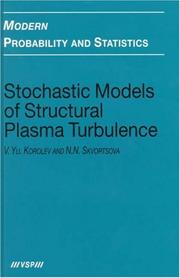| Listing 1 - 3 of 3 |
Sort by
|
Book
ISBN: 9780511760303 9780521111843 9780511789489 0511789483 9780511786884 0511786883 0511760302 9780511788024 0511788029 0521111846 1107202760 1282725041 9786612725043 0511788754 0511785747 Year: 2010 Publisher: Cambridge, Mass. : Cambridge University Press,
Abstract | Keywords | Export | Availability | Bookmark
 Loading...
Loading...Choose an application
- Reference Manager
- EndNote
- RefWorks (Direct export to RefWorks)
A nonlinear Markov evolution is a dynamical system generated by a measure-valued ordinary differential equation with the specific feature of preserving positivity. This feature distinguishes it from general vector-valued differential equations and yields a natural link with probability, both in interpreting results and in the tools of analysis. This brilliant book, the first devoted to the area, develops this interplay between probability and analysis. After systematically presenting both analytic and probabilistic techniques, the author uses probability to obtain deeper insight into nonlinear dynamics, and analysis to tackle difficult problems in the description of random and chaotic behavior. The book addresses the most fundamental questions in the theory of nonlinear Markov processes: existence, uniqueness, constructions, approximation schemes, regularity, law of large numbers and probabilistic interpretations. Its careful exposition makes the book accessible to researchers and graduate students in stochastic and functional analysis with applications to mathematical physics and systems biology.
Markov processes. --- Nonlinear theories. --- Nonlinear problems --- Nonlinearity (Mathematics) --- Calculus --- Mathematical analysis --- Mathematical physics --- Analysis, Markov --- Chains, Markov --- Markoff processes --- Markov analysis --- Markov chains --- Markov models --- Models, Markov --- Processes, Markov --- Stochastic processes --- Kinetic theory of matter. --- Matter, Kinetic theory of --- Matter --- Molecular theory --- Statistical mechanics
Book

ISBN: 9783110936032 Year: 2012 Publisher: Berlin Boston
Abstract | Keywords | Export | Availability | Bookmark
 Loading...
Loading...Choose an application
- Reference Manager
- EndNote
- RefWorks (Direct export to RefWorks)


ISBN: 9783110936032 9789067644495 Year: 2012 Publisher: Berlin ;; Boston De Gruyter
Abstract | Keywords | Export | Availability | Bookmark
 Loading...
Loading...Choose an application
- Reference Manager
- EndNote
- RefWorks (Direct export to RefWorks)
| Listing 1 - 3 of 3 |
Sort by
|

 Search
Search Feedback
Feedback About UniCat
About UniCat  Help
Help News
News